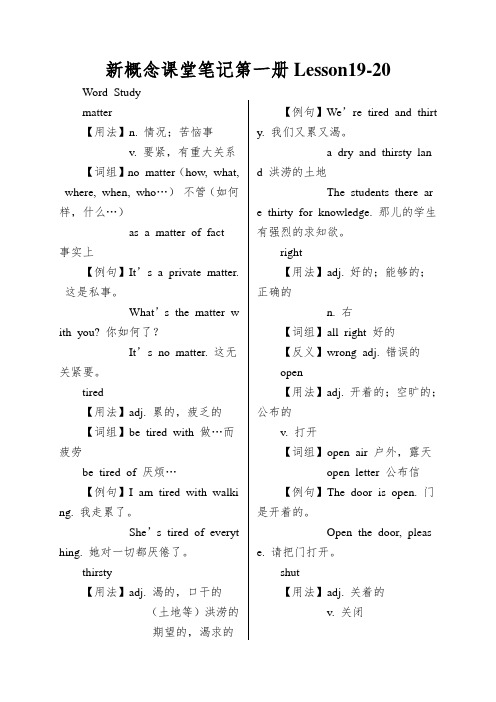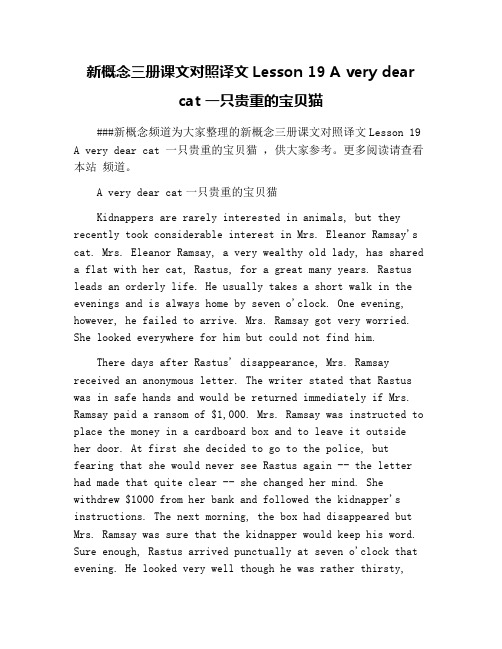lesson 19
新人教精通版四年级英语下册Lesson19教学课件ppt

Let’s chant
Summary
本课学到的重点单词:
—How many days are there in a week?
—There are ...
本课学到的重点句型:
day week Sunday
Homework
Close
He likes ice cream.
What are they talking about?
Let’s learn
Presentation
Hi, everyone! Give me a quick answer, please.
How many days are there in a week?
There are seven days in a week.
Let’s learn
Presentation
Sunday
What’s the first day of the week?
It’s Sunday.
Presentation
Listen and say
No, he doesn’t.
春去春又回,新桃换旧符。在那桃花盛开的地方,在这醉人芬芳的季节,愿你生活像春天一样阳光,心情像桃花一样美丽,日子像桃子一样甜蜜 人的志向通常和他们的能力成正比例 夫学须志也,才须学也,非学无以广才,非志无以成学 志不立,天下无可成之事 Thank you very much for taking me with you on that splendid outing to London. It was the first time that I had seen the Tower or any of the other famous sights. If I'd gone alone, I couldn't have seen nearly as much, because I wouldn't have known my way about. 会当凌绝顶,一览众山小 如果一个人不知道他要驶向哪头,那么任何风都不是顺风 一个人如果不到最高峰,他就没有片刻的安宁,他也就不会感到生命的恬静和光荣
《Lesson 19》 导学案

《Lesson 19》导学案一、学习目标1、掌握课文中的重点词汇和短语,如_____、_____、_____等。
2、理解课文的主要内容,能够准确回答与课文相关的问题。
3、培养阅读和理解英语文章的能力,提高语言运用的准确性。
4、学习并模仿课文中的语言结构,进行简单的书面表达。
二、学习重难点1、重点(1)重点词汇的拼写、发音和用法,如_____的不同词性和搭配。
(2)课文中关键句型的理解和运用,如_____句型的结构和意义。
2、难点(1)对课文中复杂句子的语法分析和理解。
(2)将所学知识灵活运用到实际的语言情境中。
三、学习方法1、预习提前预习课文,标注出生词和不理解的句子。
查阅词典,了解生词的含义和用法。
2、课堂学习认真听讲,积极参与课堂互动,回答老师的问题。
做好笔记,记录重点知识和难点解析。
3、课后复习复习课文和笔记,巩固所学知识。
完成课后作业,进行自我检测。
四、知识链接1、与本课文相关的语法知识,如_____时态的构成和用法。
2、类似主题的英语文章或阅读材料,拓展阅读视野。
五、学习过程1、导入通过展示与课文主题相关的图片、视频或提出问题,引起学生的兴趣和思考,导入新课。
2、词汇学习教师讲解重点词汇的发音、拼写、词性和用法,并举例说明。
学生跟读、拼写词汇,进行词汇练习,如填空、选择等。
3、课文阅读学生快速阅读课文,了解课文的大致内容,回答一些简单的问题,如:What is the main idea of the text?学生仔细阅读课文,理解课文的细节,完成阅读理解练习,如判断正误、回答问题等。
4、语言点讲解教师讲解课文中的重点句型和语法点,如_____的用法和结构。
学生模仿例句进行造句练习,加深对语言点的理解和运用。
5、小组讨论学生分组讨论课文中的相关话题,如_____,并发表自己的观点和想法。
每组推选代表进行发言,其他组进行补充和评价。
6、总结归纳教师引导学生回顾本节课所学的重点知识,包括词汇、句型和语法。
新概念课堂笔记第一册Lesson19-20

新概念课堂笔记第一册Lesson19-20 Word Studymatter【用法】n. 情况;苦恼事v. 要紧,有重大关系【词组】no matter(how, what, where, when, who…)不管(如何样,什么…)as a matter of fact 事实上【例句】It’s a private matter.这是私事。
What’s the matter w ith you? 你如何了?It’s no matter. 这无关紧要。
tired【用法】adj. 累的,疲乏的【词组】be tired with 做…而疲劳be tired of 厌烦…【例句】I am tired with walki ng. 我走累了。
She’s tired of everyt hing. 她对一切都厌倦了。
thirsty【用法】adj. 渴的,口干的(土地等)洪涝的期望的,渴求的【例句】We’re tired and thirt y. 我们又累又渴。
a dry and thirsty lan d 洪涝的土地The students there ar e thirty for knowledge. 那儿的学生有强烈的求知欲。
right【用法】adj. 好的;能够的;正确的n. 右【词组】all right 好的【反义】wrong adj. 错误的open【用法】adj. 开着的;空旷的;公布的v. 打开【词组】open air 户外,露天open letter 公布信【例句】The door is open. 门是开着的。
Open the door, pleas e. 请把门打开。
shut【用法】adj. 关着的v. 关闭【词组】shut off关掉,切断(电源)停止供应(煤气,水等)【例句】The window is shut. 窗户是关着的。
Shut the window, ple ase. 请关上窗户。
新概念三册课文对照译文Lesson 19 A very dear cat 一只贵重的宝贝猫

新概念三册课文对照译文Lesson 19 A very dearcat 一只贵重的宝贝猫###新概念频道为大家整理的新概念三册课文对照译文Lesson 19 A very dear cat 一只贵重的宝贝猫,供大家参考。
更多阅读请查看本站频道。
A very dear cat一只贵重的宝贝猫Kidnappers are rarely interested in animals, but they recently took considerable interest in Mrs. Eleanor Ramsay's cat. Mrs. Eleanor Ramsay, a very wealthy old lady, has shared a flat with her cat, Rastus, for a great many years. Rastus leads an orderly life. He usually takes a short walk in the evenings and is always home by seven o'clock. One evening, however, he failed to arrive. Mrs. Ramsay got very worried. She looked everywhere for him but could not find him.There days after Rastus' disappearance, Mrs. Ramsay received an anonymous letter. The writer stated that Rastus was in safe hands and would be returned immediately if Mrs. Ramsay paid a ransom of $1,000. Mrs. Ramsay was instructed to place the money in a cardboard box and to leave it outside her door. At first she decided to go to the police, but fearing that she would never see Rastus again -- the letter had made that quite clear -- she changed her mind. She withdrew $1000 from her bank and followed the kidnapper's instructions. The next morning, the box had disappeared but Mrs. Ramsay was sure that the kidnapper would keep his word. Sure enough, Rastus arrived punctually at seven o'clock that evening. He looked very well though he was rather thirsty,for he drank half a bottle of milk. The police were astounded when Mrs. Ramsay told them what she had done. She explained that Rastus was very dear to her. Considering the amount she paid, he was dear in more ways than one!绑架者很少对动物感兴趣。
课文翻译 英美报刊阅读教程中级精选本 第五版 端木义万 Lesson19

Lesson 19 It's a Glad, Sad, Mad World主观幸福感Where you live, as much a show you live, is a key influence on the feel-good factor你住在哪里,就像你在现场表演一样,是影响你感觉良好的关键因素By Walter KirnIt's almost impossible for most people in well-off countries to begin to understand how it feels to live in the extreme poverty of Calcutta, surviving in India's third largest city in a shack, or on the street with little access to clean water,food or health care.对于生活在富裕国家的大多数人来说,他们几乎不可能开始理解生活在印度第三大城市加尔各答的极度贫困中是什么感觉,在一个简陋的棚子里生存,或者在没有干净的水、食物或医疗保健的街道上生存。
The filth. The crowds. The disease.污秽、人群、疾病。
From the perspective of the comfortably housed and amply fed, these conditions sound hopeless, and the suffering they must breed seems unimaginable.从那些住得舒舒服服、吃得饱的人的角度来看,这些条件听起来让人绝望,它们所带来的痛苦似乎难以想象。
But not as unimaginable as this: according to a researcher who employs a method of ranking human happiness on a scale of 1 to 7, poor Calcuttans score about a 4, meaning they' reslightly more happy than not.但没有这么不可思议:根据一位研究人员使用一种方法给人类幸福打分,分值从1到7,贫穷的Calcuttans给出的了4分,表示他们的幸福程度稍微高一些。
新概念第一册 lesson 19-20 知识点全析

The students there are thirsty for knowledge. 那里的学生有强烈的求知欲。
6.mum n妈妈 mummy (英) 埃及木乃伊 mommy(美)
7.sit down 坐下 Sit down,please. =Have a seat,please. ice cream
8.right adj.好,可以
All right .好吧 right(R) left(L) lefthander 左撇子
three ice creams
9.ice cream 冰激凌
ice 冰 cream 冰激凌
既可数也不可数
思考:Ice cream是否可数?
三 Lesson 20 Look at them! 单词讲解
一 Lesson19 课文预览
二 Lesson19 单词讲解
三 Lesson 20 单词讲解
《 新概念一 》 Lesson 19-20
作者:Jency
四 句型及语法讲解
五 知识拓展
二 Lesson19 单词讲解
1.matter n. 事情
① n. 事情,事件 It’s a private matter. He’s not very interested in financial matters. ② n. 麻烦事,困难
教室里有一个学生。 There is a keyboard operator in the office. 办公室有一位键盘操作员。 那儿有一位海关官员。 There is a customs officer over there.
课桌上有一枝钢笔、两本书和一把小刀。
There is a pen, two books and a knife on the desk.
Lesson19 课件
Brian:You've already finished? Danny:Yes! It was easy!
Jenny:We’d love to hear your poem , Danny.
2. Read the lesson again and compare poems with
stories.
poems
stories
bce
ad
a.It must have a beginning,a middle and an end. b.Although it is short,every word must have power and
compare… to…
把……比作……
She compares the rose to the symbol of love.她 把玫瑰比作爱情的象征。
Language points 4
Poin t
辨析 too much,much too与too many
too much意为“太多”, You have given me too much.
still 仍然, 还
放在系动词后,实义动 词前,表示继续做某事 ,多用Байду номын сангаас肯定句和疑问 句中。
He is still standing.他 还在站着。
已经
He has already
用于肯定句中 finished his
。
drawing.他已经完
成了他的画。
人教版五年级下册Lesson 19
Lesson 19,Just speak第十九课,说Mark comes from Britain.Mark来自英国.Mark and his friend, Barry,Mark和他的朋友,Barry,are showing some photos to Gao Wei and his classmates.给高伟和他同学们看一些照片.The photos show us how British children learn这些照片给我们展示着英国的小孩子是怎样学习的Mark:This photo shows our classroom.Mark:这些照片拍的是我们的教室.All the chairs and desks are in groups.所有的椅子和桌子都聚在一起.We usually do group work.我们通常是团体工作Gao Wei:Are there any computers in your class?高伟:你们班有多少台电脑?Mark:Yes. We have twelve computers in the computer corner. Mark:是的.我们电脑角有十二台.There is also a science corner?这里也有自然科学角吗?Li Yan:What do you do in your science corner?李燕:你们在科学角做什么?Mark:We study plants and animals.Mark:我们学习植物和动物.Gao Wei:Is there a library in your class?高伟:在你们教室有图书馆吗?Mark:Yes,we have a mini-library.Mark:有啊,我们有一个mimi图书馆.We read Storybooks and look at cartoons.我们阅读故事书和看卡通画.Zhou pei:That's interesting.周佩:真有趣.Mark comes from Britain.Mark来自英国.Mark and his friend, Barry,Mark和他的朋友,Barry,are showing some photos to Gao Wei and his classmates.给高伟和他同学们看一些照片.The photos show us how British children learn这些照片给我们展示着英国的小孩子是怎样学习的Mark:This photo shows our classroom.Mark:这些照片拍的是我们的教室.All the chairs and desks are in groups.所有的椅子和桌子都聚在一起.We usually do group work.我们通常是团体工作.Gao Wei:Are there any computers in your class?高伟:你们班有多少台电脑?Mark:Yes. We have twelve computers in the computer corner. Mark:是的.我们电脑角有十二台.There is also a science corner?这里也有自然科学角吗?Li Yan:What do you do in your science corner?李燕:你们在科学角做什么?Mark:We study plants and animals.Mark:我们学习植物和动物.Gao Wei:Is there a library in your class?高慧:在你们教室有图书馆吗?Mark:Yes,we have a mini-library.Mark:有啊,我们有一个mimi图书馆.We read Storybooks and look at cartoons.我们阅读故事书和看卡通画.Zhou pei:That's interesting.周佩:真有趣.Lesson 20,1.Just practise第二十课,1.练习Is there a library in your classroom?在你们的教室有图书馆吗?Yes,there is./No,there isn't.是的,有./不,没有.What do you do in the library?你们在图书馆里做什么?We read storybooks.我们阅读故事书.computer corner science corner art corner do project work 电脑角自然科学角艺术角设计作业study plants and animals do printing on the paper学习植物和动物在纸上绘画.4.Let's read and chant Uu4.让我们一起读和吟唱We work very hard, In the science clubs.我们在科学俱乐部工作很努力。
Lesson 19 Sold out单词讲解 课文讲解
Lesson 19 Sold out单词讲解1.hurry v.匆忙hurry to the ticket office 匆忙的赶去售票处(hurry to ..... 匆忙赶去某个地方)Hurry up! 赶快!快一点!hurriedly adv. 匆忙地do sth. hurriedly 匆忙地做某事2.ticket office 售票处3. pity n.令人遗憾的事What a pity!多么遗憾的一件事呀!//感叹名词用what4.explain 大声的说5. return v.退回return the books 把书还回去return home 回到家( v. 回到)return n. 返回,回来return ticket 回程票Sir , may I see your return ticket? 先生,我可以看一下你回程的机票吗?4. sadly adv. 悲哀地,丧气地sad adj. 悲哀的,伤心的课文&语法讲解Key points:情态动词may/can情态动词还是动词,但是它不再表示动作,它通常表示一个人的情绪、情感、态度; 表示可能性。
比如:你必须做这件事:你可以做这件事:你没必要做这件事。
(这就是你做这些事的态度)2. 情态动词通常不会单独使用,后面接动词原型。
3. 情态动词没有人称的变化,就算它在主语第三人称单数的后面,它也照常保持动词原型。
4. 情态动词时态的变化很有限,基本上只有现在和过去两种形式。
比如must,只有现在这种形式。
Review:L17 情态动词must表示推测(非常有把握的推测,几乎接近事实,翻译成“一定......”)推测现在:must + 动词原型(must do/ must be)推测过去:must + have done"The play may begin at any moment." I said. "It may have begun already," Susan answered.at any moment 随时这两句话中的may都表示推测,一个推测现在,一个推测过去。
冀教版英语五年级下册Lesson19 Li Ming Comes Home优秀教学设计
使学生在听读练习中体会动词过去式特殊的读法
3minutes
出示对比例句,引导学生观察、发现动词过去式的使用条件和读、写一般规律
阅读、观察对比例句,发现动词过去式的使用条件和读、写一般规律
引导学生在阅读、观察中发现动词过去式的使用条件和读、写一般规律
3minutes
引导学生自读part1,圈出更多动词过去式,朗读
5minutes
组织学生利用过去式笔头回答问题:What did you do yesterday?
利用过去式笔头回答问题:What did you do yesterday?
巩固所学知识,培养书写能力
1minutes
Homework:
1.Ask and write downwhat yourfriendsdid yesterday!
自读part1,圈出更多动词过去式,朗读
通过查找、朗读情境中的动词过去式,检测学生对动词过去式的一般形式和准确朗读的掌握情况
5minutes
组织学生选择→填空练习。
选择→填空练习。
检测、巩固中引导学生学以致用
2minutes
组织学生chant
跟老师一起chant
调动气氛,复习巩固
6minutes
组织学生在示例引导下来讲李明的故事。
情感态度
一定程度上培养学生乐于分享和懂得感恩的美好品质。
教学重难点
重点
1.动词过去式的变化规则。
2.一般过去时的基本用法。
难点
1.动词过去式的变化规则。
2.一般过去时的基本用法。
教学过程
教学环节(注明每个环节预设的时间)
教师活动
学生活动
设计意图
